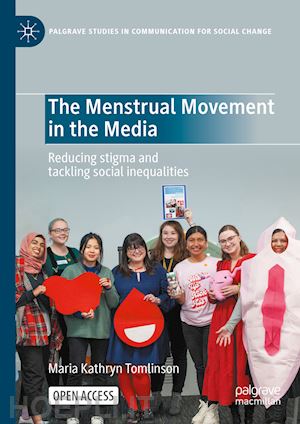
Questo prodotto usufruisce delle SPEDIZIONI GRATIS
selezionando l'opzione Corriere Veloce in fase di ordine.
Pagabile anche con Carta della cultura giovani e del merito, 18App Bonus Cultura e Carta del Docente
This book investigates the impact of the mediation of menstruation and menstrual activism on young people’s knowledge, attitudes, behaviours, and interpersonal relationships.
Since 2015, the menstrual movement has become increasingly visible on social media and in news media from across the globe. In Great Britain, the menstrual movement brings together a diverse group of activists who aim to reduce menstrual stigma and tackle menstrual inequities. By combining original interviews with 32 menstrual activists and focus groups with 77 young people (including women, men, and non-binary teenagers), this book offers an in-depth exploration of this movement and its impact. This book argues that menstrual stigma has decreased, awareness around related health and social issues has increased, and girls as well as other menstruating young people are feeling an increased sense of connection and solidarity with each other. Menstruation is shifting from a very private experience to one of collective concern. It is evident that social media, and, to some extent, news media, have played a key role in disseminating the discourses and aims of menstrual activists that have engendered some of these changes. Nevertheless, this book also examines how the media have negatively impacted young people and identifies further changes that are necessary for the achievement of gender equality.
This book makes a significant contribution not only to the fields of health communication, feminism, social movement studies, and critical menstruation studies, but also provides evidence and recommendations that will be of interest to NGOs, advocacy groups, policymakers, schools, workplaces, and medical professionals.
This is an open access book.
1.Introduction.- 2. The Demands of the Menstrual Movement: Stigma, Misinformation and Social Inequalities.- 3. The Discursive Tactics of the Menstrual Movement: Destigmatisation, Intersectionality and Collective Identity.- 4. Seeing Menstruation in the Media: The News, Advertisements, and Memes that Teenagers Encounter via Social Media and the Mainstream Media.- 5.The Impact of the Media and the Mediated Menstrual Movement on young people’s attitudes towards activism, menstruation, and menstrual stigma.- 6. The Impact of the Media and the Mediated Menstrual Movement on Young People’s Awareness and Perceptions of Menstrual Inequities.- 7. Conclusion.
Dr. Maria Kathryn Tomlinson is a lecturer in public communication and gender at the University of Sheffield. Her research examines the impact of health communication on social inequalities. She is the author of From Menstruation to the Menopause: The Female Fertility Cycle in Contemporary Women’s Writing in French.











Il sito utilizza cookie ed altri strumenti di tracciamento che raccolgono informazioni dal dispositivo dell’utente. Oltre ai cookie tecnici ed analitici aggregati, strettamente necessari per il funzionamento di questo sito web, previo consenso dell’utente possono essere installati cookie di profilazione e marketing e cookie dei social media. Cliccando su “Accetto tutti i cookie” saranno attivate tutte le categorie di cookie. Per accettare solo deterninate categorie di cookie, cliccare invece su “Impostazioni cookie”. Chiudendo il banner o continuando a navigare saranno installati solo cookie tecnici. Per maggiori dettagli, consultare la Cookie Policy.